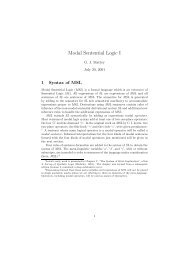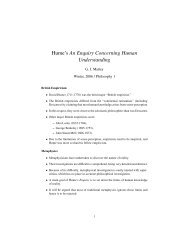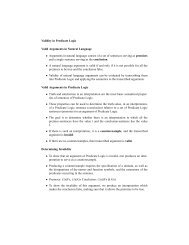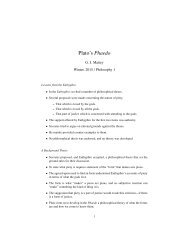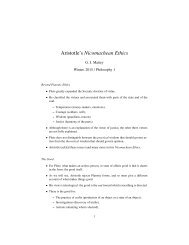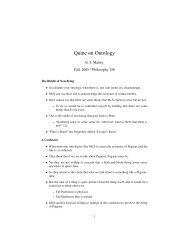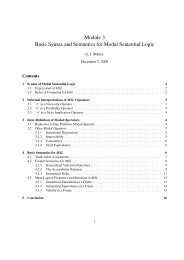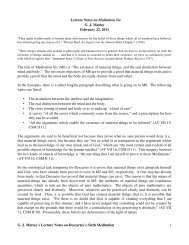Kant's Grounding for the Metaphysics of Morals - the UC Davis ...
Kant's Grounding for the Metaphysics of Morals - the UC Davis ...
Kant's Grounding for the Metaphysics of Morals - the UC Davis ...
You also want an ePaper? Increase the reach of your titles
YUMPU automatically turns print PDFs into web optimized ePapers that Google loves.
The Categorical Imperative and Duties<br />
• The categorical imperative is a very abstract principle.<br />
• If it is to serve as a moral law governing <strong>the</strong> actions <strong>of</strong> rational beings, <strong>the</strong> specific<br />
duties <strong>of</strong> those beings should be derivable from <strong>the</strong> imperative itself.<br />
• Kant derives instances <strong>of</strong> four kinds <strong>of</strong> duties, which are arranged according to<br />
<strong>the</strong> way duties were understood in his time.<br />
Perfect<br />
Imperfect<br />
(Permits no exceptions) (Permits exceptions)<br />
To ourselves Preserve my own life Develop my talents<br />
To o<strong>the</strong>rs Make honest promises Help o<strong>the</strong>rs<br />
• In each case, a maxim allowing <strong>the</strong> violation <strong>of</strong> <strong>the</strong> duty cannot be universalized.<br />
An Example: Making Honest Promises<br />
• Perhaps <strong>the</strong> most famous <strong>of</strong> <strong>the</strong>se examples is that <strong>of</strong> a perfect duty to o<strong>the</strong>rs to<br />
make only honest promises to <strong>the</strong>m, an example that was examined in <strong>the</strong> First<br />
Section.<br />
• Because <strong>the</strong> duty is said to be perfect, it should admit <strong>of</strong> no exceptions.<br />
• Thus, it is <strong>for</strong>bidden to make a dishonest promise even if making that promise<br />
would help ourself (or someone else) escape from difficulty.<br />
• A maxim allowing <strong>the</strong> making a dishonest promise is not universalizable, because<br />
if it were, all trust would be destroyed.<br />
• If all trust is destroyed, <strong>the</strong>n making <strong>the</strong> promise would not serve my interest.<br />
• It is a standard objection to Kant that in some cases, such as that <strong>of</strong> preventing a<br />
murder, it is permissible to make a false promise.<br />
Justifying <strong>the</strong> Categorical Imperative<br />
• At this point, Kant has explained two things:<br />
– How an imperative could be categorical,<br />
– How a categorical imperative can account <strong>for</strong> all possible kinds <strong>of</strong> duties.<br />
• But he has yet to prove that <strong>the</strong>re is a categorical imperative that applies to all<br />
rational beings.<br />
• The pro<strong>of</strong> cannot be based on experience, given <strong>the</strong> generality <strong>of</strong> its application.<br />
• Yet it is tempting to appeal to empirical motives and laws, given <strong>the</strong> difficulty <strong>of</strong>:<br />
6



